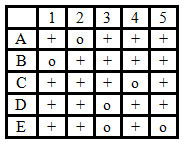The host species in which a parasite becomes an adult and reaches maturity is referred to as a(n) ________ host
Fill in the blank(s) with correct word
definitive
You might also like to view...
Indicate the order of the point mutations in the rII region.
Shown below are the maps of a series of rII- deletion strains (1–5). The deleted region is indicated as (......) and the intact region as ______.
1 ___________(...........)_______________
2 _________________(...........)_________
3 (.....................)_____________________
4 ________________________(................)
5 _____(..........)______________________
rII- phage strains A-E have point mutations in the rII region. E.coli K(?) cells are coinfected with one phage that has a deletion and one phage that has a point mutation. The presence of wild-type progeny phage is assessed by the presence (+) or absence (o) of plaques.

A) CADBE
B) DEBAC
C) BADCE
D) ABDEC
E) CEADB
Anchorage dependence of animal cells in vitro or in vivo depends on which of the following?
A) attachment of spindle fibers to centrioles B) response of the cell cycle controls to signals from the plasma membrane C) the binding of cell-surface phospholipids to those of adjoining cells D) response of the cell cycle controls to the binding of cell-surface phospholipids
Oligosaccharides include ____.
A. sucrose only B. glucose only C. fructose only D. lactose only E. both sucrose and lactose
Is the lac operon transcribed when lactose is present?
A. Yes, lactose is converted to another sugar that binds to the repressor, freeing the promoter region. B. Yes, lactose binds to RNA polymerase, allowing it to bind to the promoter and transcribe the operon. C. No, lactose is converted to another sugar that binds to the two operators preventing transcription. D. No, lactose has no effect on transcription of the lac operon. E. No, lactose binds to the second operator, blocking transcription by RNA polymerase.